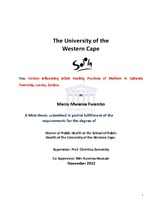Factors influencing infant feeding practices of mothers in Kabwata Township, Lusaka, Zambia
Abstract
Background: Appropriate and adequate infant feeding practices are an important factor in achieving optimal health in infants. Inappropriate and inadequate infant feeding practices contribute significantly to ill-health in infants. Both WHO and UNICEF recommend exclusive breastfeeding for the first six months both in the context of HIV and otherwise unless exclusiv formula feeding can meet each of five conditions: acceptable, feasible, affordable, sustainable and safe (AFASS). The modes of infant feeding include exclusive breastfeeding, formula feeding and mixed feeding. Medical recommendations and social pressures related to infant feeding in high HIV-prevalence low-income communities may have shifted infant feeding practices. The aim of this study was to explore factors influencing infant feeding practices and decision making among women in one such community, Kabwata Township, in Lusaka, Zambia. Method: An exploratory qualitative study was conducted at Kabwata Health Centre in Kabwata Township in Lusaka, Zambia. Convenient sampling was used to recruit 32 women for focus group discussions and three key informants (two nurses and one social worker) for individual interviews. Verbal consent was received from all participants. Semi-structured interview guides were used to elicit discussion by all participants. Discussions were tape recorded and transcribed verbatim. Thematic data analysis was used to analyze the qualitative data. Results: Most FGD participants reported that they themselves initiated breastfeeding soon after giving birth, but not all of them breastfed exclusively for the first six months, as is currently recommended. The major factors influencing infant feeding included; influence from family and
friends, stigma and discrimination, influence from health care providers, practical realities such as maternal employment and poverty, and cultural/traditional practices. Conclusion: While breastfeeding is valued and accepted, most women do not or cannot exclusively breastfeed for six (6) months for various reasons. Paradoxically, the social value of breastfeeding and the knowledge that breast milk can transmit HIV reinforce mixed feeding as the predominant feeding practice. Key informants reported that women attending health care services at Kabwata health centre were encouraged and taught to breastfeed their infants exclusively for six months. There is a need to re-look at the way the women are being encouraged, taught and supported so that the apparent knowledge and acceptance of breastfeeding can translate into improved infant feeding practices. Awareness campaigns need to include all stakeholders including family members, the community, employers and the women themselves in order to make exclusive breastfeeding easier for the women.

